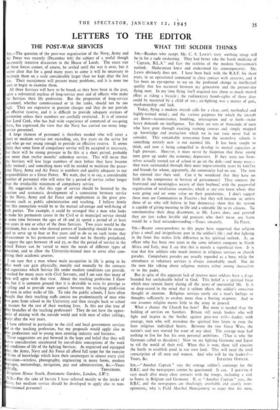THE POST-WAR SERVICES
LETTERS TO
THE EDITOR
Sta,—The question of the post-war organisation of the Navy, Army and Air Force was recently (December 6th) the subject of a useful though necessarily tentative discussion in the House of Lords. The exact size of these forces cannot, of course, be settled until the war is over, but it seems clear that for a good many years to come it will be necessary to maintain them on a scale considerably larger than we kept after the last war. Their recruitment will present many problems, and it is none too soon to begin to examine them.
All three Services will have to be based, as they have been in the past, upon a substantial nucleus of long-service ;nen and of officers who make the Services their life profession. But the proportion of long-service personnel, whether commissioned or in the ranks, should not be too high. They are expensive in pension charges and they do not provide an effective reserve, and it is difficult to provide adequate avenues of promotion unless their numbers are carefully restricted. It is of interest that Lord Cork, who has had wide experience of command of sea-going fleets, has expressed the view that the Navy has carried too many long- service personnel.
A large element of personnel is therefore needed who will enter a short or medium service not exceeding, say, five years on the active list nd who go out young enough to provide an effective reserve. It seems ikely that some form of compulsory service will be accepted as necessary, ut there will be strong pressure to fix this at a short period, probably of more than twelve months' unbroken service. This will mean that he Services will lose large numbers of men before they have become ully trained ; and something more will be needed to maintain the peace- ;me Navy, Army and Air Force in numbers and quality adequate to our esponsibilities as a Great Power. We want,. that is to say, a considerable umber of personnel who will enter for a period of service rather longer han the irreducible minimum of compulsory service.
My suggestion is that this type of service should be fostered by the reation and systematic development of a connection between service n the Navy, Army and Air Force and employment in the great pro- essions such as public administration and teaching. I believe firmly at this connection would be to the mutual advantage and well-being of oth parties. For example, it could be arranged that a man who looks o make his permanent career in the Civil or in municipal service should t some time between the ages of a and 25 spend a period of at least o years in one or other of the three Services. Two years would be the inimum, but a man who showed powers of leadership should be encour- ged to serve up to four or five years and to do so on such terms that dvancement in his permanent career would not be thereby prejudiced. suggest the ages between I8 and 25, so that the period of service in the ed Forces ' can be varied to meet the needs of different types of ducation, and to allow the University-trained men to serve after corn- eting their academic courses.
I am sure that a man whose main occupation in life is going to be Nice work can gain physically, morally and mentally by the contacts d experience which Service life under modern conditions can provide. worked for many years with Civil Servants, and I am sure that many of em will agree with that view. About the teaching profession I know ss, but it is common ground that it is desirable to raise its prestige as calling and to provide more contact between the teaching profession d men in other walks of life. To take the public schools, I have often ought that their teaching staffs consist too predominantly of men who ye gone from school to the University and then straight back to school masters for the rest of their working lives. Is this not also true of her brandies of the teaching profession? They do not have the oppor- nity of mixing with the outside world and with men of other callings, cept after the war years.
I have referred in particular to the civil and local government services d to •the teaching profession, but my proposals would apply also to her professions and to young men entering industry and business.
These suggestions are put forward in the hope and belief that they will ceive consideration uncoloured by out-of-date conceptions of the work d conditions of life of the fighting Services. As organised and equipped y, the Army, Navy and Air Force all afford full scope for the exercise forms of knowledge which have their counterpart in almost every civil pation—wireless, photography, engineering in many forms, modern guages, meteorology, navigation, pay and administration, &c.—Yours Kingston House South, Ennismot•e Gardens, London, S.W.7.
N.B.—For the sake of brevity I have referred mainly to the intake of cers, but medium service should be developed to apply also to non- mmissioned personnel. ,-






















 Previous page
Previous page